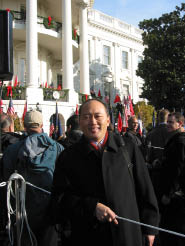| China and the U.S. Should Pull Together, Not Rock the Boat
By LIU QIONG
Equal treatment for Chinese enterprises in the U.S. was an agenda item in the second round of the China-U.S. Strategic and Economic Dialogue (S&ED). By the end of 2010, American investment in China exceeded US $60 billion, while China's investment in the U.S. was only one-fifteenth of that, around US $4 billion.
Chinese President Hu Jintao paid a state visit to the U.S. in January 2011 before the S&ED's third round. During his trip he visited an exhibition in Chicago about Chinese enterprises in America's Midwest; one of the exhibitors was Wanxiang America Inc., a major manufacturer of automotive parts and considered one of the most successful Chinese multinationals in the U.S., where it has 28 subsidiary companies and a 2010 sales volume in excess of US $2 billion.
Through the first and second rounds of the dialogue, both China and the U.S. have made great efforts to enhance bilateral relations and reach some common understanding. Before the third round of the dialogue China Today called on Jia Xiudong's deep understanding of China-U.S. relations. Jia was an invited research fellow of the China Institute of International Studies (CIIS) and focused on international strategy and China-U.S. relations. He also worked in the Chinese embassy in the U.S. for many years, and in 2009 was involved in preparatory work for the first round of the S&ED in Washington D.C.
 |
| China-U.S. relations expert Jia Xiudong visiting the White House. |
China Today: On July 27, 2009, the first round of the S&ED was held in Washington, D.C. against the backdrop of a common battle with the international financial crisis. From today's perspective, how do you see the dialogue's role in promoting economic recovery?
Jia Xiudong: As globalization goes deeper and deeper, the degree of interdependence between countries has grown, as has the need to work together for the common good. While the global financial crisis has posed a serious challenge to the world economy, the international community has adopted a variety of economic stimulus plans, each making its due contribution to the easing of the crisis and driving economic recovery.
The first round of the S&ED was held under just such circumstances. The two giants, China and the U.S., discussed major bilateral issues facing the economy, finance, and safeguards to trade stability. The dialogue also complemented multilateral negotiating bodies such as the G20 Summit.
The Obama administration had just taken over so the dialogue was a useful platform to explore the basis of each country's policies for dealing with the financial crisis. The platform has played a positive role in promoting cooperation during the financial crisis and further developing bilateral relations.
China Today: Since President Obama took office China-U.S. relations have experienced ups and downs. How do you think the relationship stands today?
Jia Xiudong: Ups and downs in our relations are perfectly normal. It was the same under George Bush. China-U.S. relations got off to a good start in the early days of this administration and uninterrupted contact has been maintained.
However, there are some persistent issues below the surface – the same old problems of arms sales to Taiwan, and trade disputes. And these have been of course joined by new ones like Google's departure from the mainland.
| 